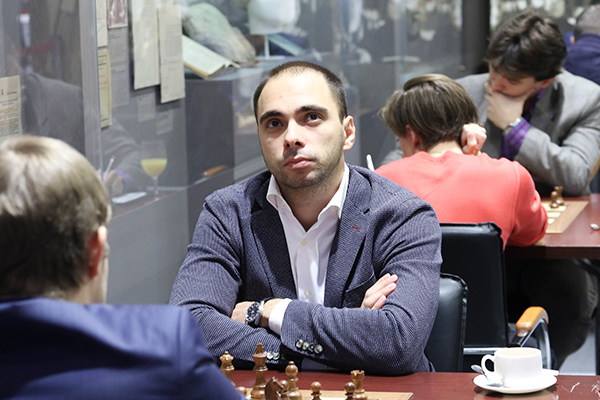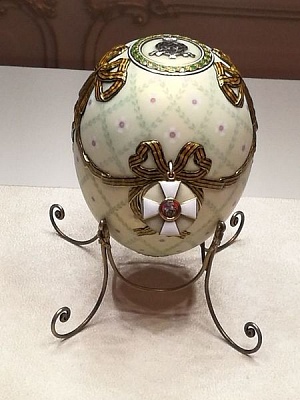Mirrors and Witches
Superfinals, round 3. Misha Savinov reports from St. Petersburg
The rating favorite of the men's Superfinal returned to 50 percent with a beautiful Gruenfeld victory, but the blistering young leaders are not stopping. Vladimir Fedoseev won his third in a row, and Daniil Dubov, against all odds, followed suit! A quick reminder: last year the “+3” score was good for a sole win...
Round 3, men
Dubov-Romanov 1-0, Fedoseev-Sjugirov 1-0, Matlakov-Inarkiev ½-½, Volkov-Svidler 0-1, Malakhov-Tomashevsky ½-½, Vitiugov-Riazantsev ½-½.
Daniil Dubov vs. Evgeny Romanov
One of the two leaders of the Superfinal, Daniil Dubov faced the rating underdog Evgeny Romanov, whose promotion was probably the biggest surprise of the Higher League. On paper Dubov's chance to extend his winning streak looked very real, however, about 20 moves into the game I could not find anything I liked about White's position. I asked grandmaster Evgenij Miroshnichenko, but he was also surprised by Dubov's opening choice: “It looks like he wants to play a Karlsbad structure with most of his pieces standing on wrong squares.”
Evgeny Romanov had an active option associated with the h-pawn march, but it seems he had prepared himself to earn a hard-fought draw and wanted to stick to the plan. Instead of playing for mating threats, he transferred his light-squared bishop on the queenside, “spending four tempi to bring it to a worse square”, as Dubov needled after the game. Then the last pair of knights was traded, the game entered a completely dull phase and remained such for a while. Black had a weakness on b7, which he could hold easily either by protecting with heavy pieces or by attacking White's a-pawn. The best White could hope for would be trading those pawns and focusing the firepower on another backward pawn, c6. However, and I quote Dubov again: “White will have an advantage, but this is a dead draw anyway”.
This was too little for Dubov's ambition. How can someone other than Magnus Carlsen squeeze a point against a grandmaster in such position? However, at some point the quality of Romanov's move deteriorated dramatically. He didn't even need especially accurate moves to hold, but he did almost everything wrong. First, Black traded the queens (holding with the queens on the board is much eassier), following it by a draw offer, then needlessly broke his pawn chain, then, after losing that lonesome e-pawn, failed to trade his c-pawn for White's d-pawn, which would lead to another book draw... Little by little White consolidated, returning his cutoff king to the main front without trading any paws.
Such rook endgames are often incredibly deep and rich in opportunities, and it is not impossible that Black could hold with the perfect play. However, in practice White's win was imminent, provided how soft Black's resistance had been. In a couple more moves, Evgeny blundered and resigned immediately. Thus, Daniil Dubov moved to +3.
At the press conference Dubov said the only thing that pushed him forward around move 30 was the ban of draw offers. Actually, I am not sure this rule is even implemented at the Superfinal – I asked someone a couple of days ago and was told it is not. Maybe I should ask the Chief Arbiter tomorrow, just to make sure. It would be funny to find out that Daniil won this game only because he did not know the rules.
Now, scroll down to the replayer and take a sober look at that ending. How on earth one can win it against a titled player? Black magic?
Vladimir Fedoseev vs. Sanan Sjugirov
In his search for new ideas in the Catalan, Vladimir Fedoseev, the co-leader of the Superfinal, came up with 8.Bc3 and was quite surprised to see it played on another board by Maxim Matlakov. The players even broke their poker faces and exchanged childish smiles. Both games of this thematic match followed a similar course: Black solved opening problems, but then played inaccurately and faced trouble.
Sjugirov quickly threw a knight on e4 and reinforced it with another one. Fedoseev advanced his queenside pawns, but Black found dynamic counterplay, sacrificing a pawn for the bishop pair. White's extra pawn was safely blockaded, and Black only needed to make a couple of accurate moves to sign the scoresheets. However, at that point Sanan began to drift away. He hesitated for too long with a rook invasion and allowed White to activate his worst piece – the b1-knight. When the knight arrived on c4, Black's position became very difficult.
“This actually happens quite often – you give your opponent a promising position and then capitalize on him losing sanity”, said Fedoseev. Positions with unbalanced material are tricky – a couple of inaccuracies, the evaluation changes dramatically, and there is no way to make a comeback. And this is what happened – after White got an advantage, it grew up so quickly, like an avalanche, and everything was over in a few moves. Fedoseev advanced to +3, while Sjugirov, who looked strong in the first two rounds, suffered a first lost.
Maxim Matlakov vs. Ernesto Inarkiev
As I already mentioned, in the opening this game mirrored Fedoseev-Sjugirov. However, Inarkiev chose a completely different way of handling the position. He quickly carried out the c6-c5 break and cleared the center for minor pieces. A sharp struggle ensued. White sacrificed a pawn, and it did not impress for a while, but then in the mutual time trouble Black slipped. When the time control passed, Matlakov had an exchange for a pawn and decent winning chances despite his exposed king. Unfortunately for the local fans, the player from St. Petersburg failed to find the proper way to deal with the opponent's counterplay, and Ernesto managed to escape with the perpetual.
Matlakov was extremely disappointed with this result and left the building quickly.
“Did you get any enjoyment from this game?”, I asked Inarkiev. He smiled and replied:
“I got everything from this game.”
This was a nerve-wrecking battle, but Ernesto is a true buccaneer at the board and lives for this kind of chess. I am sure the game will look even more thrilling when he opens his laptop in the hotel room...
Sergey Volkov vs. Peter Svidler
Having suffered a tough defeat yesterday, the tournament's rating favorite got a chance to recover against an underdog. Playing for a win as Black may have been difficult against some, but Sergey Volkov never shies away from challenges.
In a rare sideline on his favorite Gruenfeld, Svidler spent a great deal of time on the 9th move, which was both the most logical and well known to Peter. The thing is that White's most obvious response would lead to mass exchanges, and the resulting symmetrical ending would end in a draw in at least 90 games out of a hundred. For a while Peter searched for ways of avoiding that endgame and failed, but decided to play the move regardless. Much to his surprise and joy, Sergey quickly responded in a completely different direction, creating a sharp and unbalanced position. Black's chances in the ensuing struggle would have been better even in vacuum, without taking rating difference and stylistic preferences into consideration.
When Peter Svidler got everything he could hope for – a double-edged asymmetrical position in the Gruenfeld – he only needed to complete the final step – outplay a solid grandmaster. Luckily, Volkov's moves today were anything but solid – he was aggressive and ambitious, and decided to refute Black's setup, pushing pawns away from his king. On the 23rd move his pawn attacked Black's bishop, but the bishop remained still. White accepted the sacrifice, then made another greedy move – and he was swept away by a very first wave of Black's attack. Sergey admitted defeat under the threat of a forced mate in one, overstepping the time limit seconds before resignation. A brilliance by Svidler!
Vladimir Malakhov vs. Evgeny Tomashevsky
...Or the Academician versus the Professor. Two most academic looking chess players in Russia had an entertaining theoretical dispute in the Reti Opening. In a fashionable variation, employed, among others, by Vachier-Lagrave, Tomashevsky remembered more than his opponent. Well, perhaps I should not use this verb, because:
“I studied this line a lot with the computer and knew all the evaluations by heart, but did not remember the exact moves in most lines”, said Tomashevsky during the post mortem. “You cannot remember everything the computer says, you need to start playing chess at some point, too.”
Malakhov's personal theory book on the subject was a bit thiner, and when he started playing on his own, he came out with an interesting pawn sacrifice idea, followed by a blockade on the b-file. Unfortunately, this setup, while allowing White to finally complete the development, was lacking a punch.
“I have no attacking resources obviously, but plenty of defensive resources”, said Malakhov about his position. But having a draw in hand isn't much when you play White.
The game reached a positional stalemate, and the grandmasters, unable to find ways of making progress, began repeating the moves.
Nikita Vitiugov vs. Alexander Riazantsev
In a completely standard position of the Catalan Opening, Alexander surprised his opponent with a rare continuation – 7...c6.
“This move hasn't been played on a high level, thus I wasn't prepared for it. Of course, I could start thinking, could spend like an hour, going deeply into the intricacies of this position, but thinking over the board is not in fashion these days. So I went for one of the logical setups, and Black equalized without much trouble. I liked his recapture on f6 with a pawn – the weakness of Black's kingside plays no role. He could even get a slightly better position, so I decided to play it very safe”, explained Nikita Vitiugov. Quite practical!
A rather boring game, but those practicing the Catalan should pay attention to the aforementioned move – Riazantsev is a strong theoretician and not someone who likes to bluff in the opening. The defending champion got rather unlucky in the first two rounds in St. Petersburg, but such an easy draw against a strong opponent may send him back on the right track psychologically.
Round 3, women
Bodnaruk-Goryachkina ½-½, Galliamova-Shuvalova 0-1, Girya-Pogonina ½-½, Gritsayeva-Kovalevskaya ½-½, Gunina-Ovod 1-0, Guseva-Kashlinskaya ½-½.
Alina Kashlinskaya had a seemingly difficult position as Black against Marina Guseva, but White's advantage evaporated around the move 30, and a draw was agreed after the time control. With 2.5 points, Alina remains a sole leader of the championship, with three players, Goryachkina, Gunina, and Pogonina, half a point behind.
The Oscar of the day goes to Valentina Gunina and Evgenija Ovod. After the first 21 moves an equal position arose, and it wasn't particularly clear how either side could make progress. Well, Valentina found the way – she simply threw a rook in the enemy king's general direction, abandoning her own f2-pawn. Just a pawn blunder for the computer; an utter shock for the commentators and audience. Ovod grabbed the pawn and then another one; everything seemed in order. Then White pieces performed a magical dance around Black's king, moving back and forth – and suddenly Black was dead lost. She is definitely a witch, that Gunina girl. Starting with move 26, every move White played was perfect, like notes in Chopin's Etudes. I could almost hear the music.
Photos by Eteri Kublashvili and Vladimir Barsky













































































































































